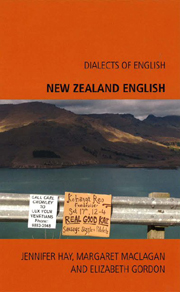Book contents
- Frontmatter
- Contents
- Preface
- Maps
- 1 Geography, Demography and Cultural Factors
- 2 Phonetics and Phonology
- 3 Morphosyntax
- 4 New Zealand Vocabulary and Discourse Features
- 5 The Origins of New Zealand English
- 6 Variation within New Zealand
- 7 Selected Bibliography of Works on New Zealand English
- 8 Sample Texts
- Bibliography of Cited Works
- Index
6 - Variation within New Zealand
Published online by Cambridge University Press: 12 September 2012
- Frontmatter
- Contents
- Preface
- Maps
- 1 Geography, Demography and Cultural Factors
- 2 Phonetics and Phonology
- 3 Morphosyntax
- 4 New Zealand Vocabulary and Discourse Features
- 5 The Origins of New Zealand English
- 6 Variation within New Zealand
- 7 Selected Bibliography of Works on New Zealand English
- 8 Sample Texts
- Bibliography of Cited Works
- Index
Summary
‘Another girl,’ Koro Apirana said, audibly, but Porourangi took no notice of him. We were used to Koro's growly ways.
‘Turituri to waha,’ Nanny Flowers said. ‘Girls can do anything these days. Haven't you heard you're not allowed to discriminate against women any more? They should put you in the jailhouse.’
‘I don't give a hang about women,’ Koro Apirana said. ‘You still haven't got the mana.’
(Whiti Ihimaera, The Whale Rider 2002 [1987], Auckland: Reed Books, p. 79)When Nanny Flowers says ‘Turituri to waha’ (be quiet) to Koro Apirana in Whale Rider there is no translation in the text. It occurs far enough into the novel so that readers, New Zealanders as well as others, can probably work out what she is saying from the context even though turituri to waha is not a phrase that is commonly used by non-Maori speakers. The other Maori word in the extract, mana (authority, prestige), by contrast, would be understood by all New Zealanders and possibly by non-New Zealanders as well.
We discussed Maori words as a characteristic part of NZE lexis in Chapter 4 (section 4.2). In this chapter we will be considering variation within NZE. The study of language variation usually focuses on two types of variation – variation across speakers, and variation within speakers. For example, some speakers, like Nanny Flowers, use many more Maori words than other speakers. Many speakers who use Maori words and phrases are themselves Maori, but non-Maori speakers also use Maori words in their speech. This is an example of variation across individual speakers. Speakers vary in the vocabulary they use.
- Type
- Chapter
- Information
- New Zealand English , pp. 95 - 111Publisher: Edinburgh University PressPrint publication year: 2008



